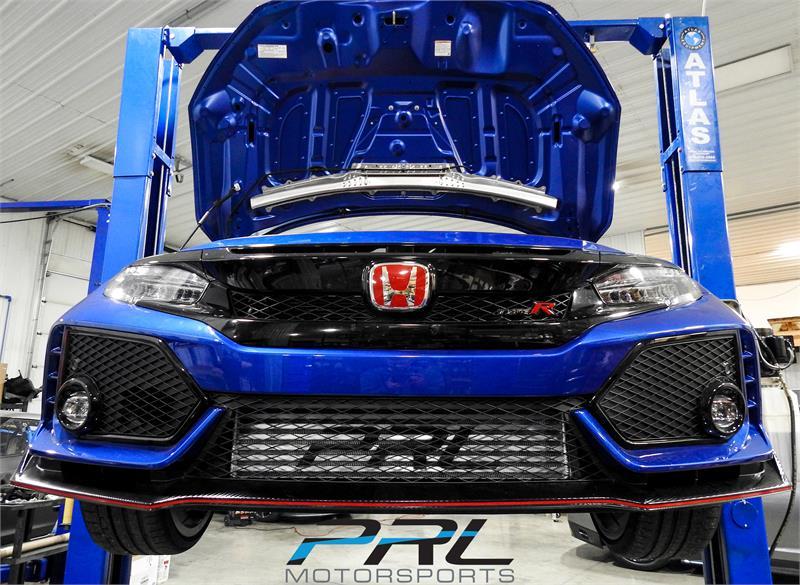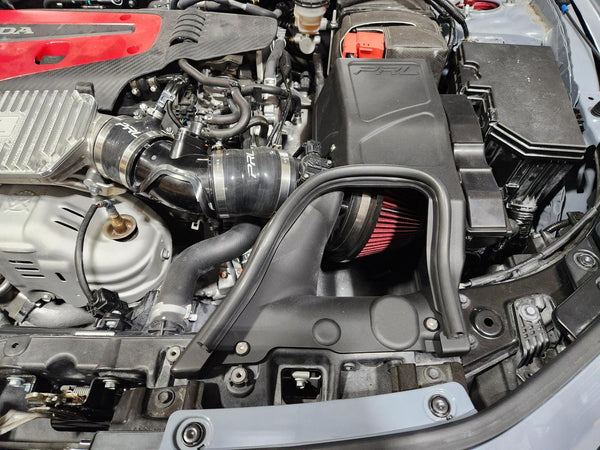For reference, we typically see temperatures drop or stay within 5% from start to finish during runs with our intercooler kits. A 40 degree increase during runs is unacceptable in our opinion, so we figured we'd take care of this issue immediately!
Here's a bit of a sneak peak of our FK8 FMIC kit renderings!
Our FMIC will utilize a similar high-density bar-and-plate intercooler core like the rest of our kits, but with a larger 26.375"x7.1"x3.5" core than our 1.5T Civic FMIC kit. We also really wanted to make our kit stand-out for Honda's flagship Civic by bringing back our CNC'd billet aluminum end tanks!
This kit will utilize factory mounting locations with billet mounting brackets and bolt up to factory charge piping. We found the factory charge piping to be perfectly adequate, so we will not not be designing any piping at this time. Our kit will also include air ducts to maintain optimal airflow! No cutting or trimming to be required.
Prototype intercooler cores have arrived as of a bit over a week ago. Here's a sneak peak an unfinished prototype end tank.
We are still working on tweaking final machining for a bit of a smoother look. Stay tuned for more pictures and testing!
Check out the Next page for the the finished product and testing!
Now onto the technical stuff.
Our 2017+ Honda Civic Type-R FK8 intercooler upgrade features a dense 550 HP bar-and-plate intercooler core which increases surface area by 85% and internal flow by 83%. We designed this core for optimal efficiency size for a variety of power goals. Spool/response is actually increased with the factory turbocharger and there is still plenty of head room for future big power goals.
No cutting or trimming is required. FMIC bolts up to factory charge pipes and air guides.
Specs:
- Power Rating: 550 HP
- Core Size: 26.5" x 3.5" x 7.0"
- Fin Style: Bar-and-Plate
- End Tank Design: 5-Axis CNC'd Billet Aluminum
Onto the comparison...
We were shocked with our first dyno pull, as there were major gains down low. In an attempt to rule out any error we put the hammer down for another dyno hit. Again, the graph showed the same characteristics as the first. This trend carried throughout the rest of our testing.
What did the logs say?
Each datalog from our dyno runs showed a 2-3 psi increase of boost until ~5,000 RPM with our intercooler, giving us an increased peak boost of 22.0 psi at ~3,600 RPM in comparison to our previous ~20 psi peak with the stock intercooler. This increased boost increased spool by 100 – 200 RPM, netting ~20 hp and ~50 ft/lbs tq gains during spool up. Increased boost also allowed us to pick up 11 ft/bs of torque by simply bolting this intercooler on. Peak horsepower showed a slight increase in the upper RPMs as well. Power gains will increase as power levels and peak boost are increased.
Let's not forget that our intercooler upgrade kit, like any intercooler kit, is not intended to be a bolt-on power-adder. The primary purpose of an intercooler upgrade is to reduce charge air temps with as little pressure drop as possible in an attempt to increase engine and turbocharger efficiency. This is exactly what our intercooler did.
We saw an average of a 4-5 degree temperature rise during dyno pulls with the stock intercooler. However, temperatures actually decreased during and after dyno pulls with our intercooler kit.
Stock Intercooler Temps:
Pre 118
Post 132
Pre 123
Post 136
Pre 113
Post 129
Pre 113
Post127
PRL Intercooler Temps
Pre 100
Post 87
Pre 107
Post 93
Pre 109
Post 91
Pre 100
Post 87
Our intercooler drastically dropped temps in comparison to the stock intercooler. This will allow cars to make better, more consistent power. We've recorded 11-14 degree temperature rises during pulls at the track and were into the low 120’s at the end of a pull on a 60 degree day for reference.





















